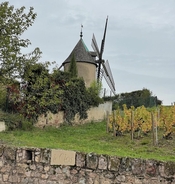 Visiting a winery or two while on holiday is a gratifying way to deepen your enjoyment and knowledge of wine. Many wine lovers fondly recall that one visit to a region or producer that either sparked their initial interest or turned a budding curiosity into a full-blown passion. Whether you’re a casual enthusiast or seasoned connoisseur, the personal connection forged by visiting a winery, seeing the winemaking process from grape to glass, and tasting the finished product on-site is an invaluable learning experience, and one you’re not soon likely to forget.
Visiting a winery or two while on holiday is a gratifying way to deepen your enjoyment and knowledge of wine. Many wine lovers fondly recall that one visit to a region or producer that either sparked their initial interest or turned a budding curiosity into a full-blown passion. Whether you’re a casual enthusiast or seasoned connoisseur, the personal connection forged by visiting a winery, seeing the winemaking process from grape to glass, and tasting the finished product on-site is an invaluable learning experience, and one you’re not soon likely to forget.
If you’re like me and the mere mention of wine and vacation in the same sentence sends you spiraling off into wistful daydreams, or you’re seeking new opportunities to merge your love of travel with your love of wine, I highly recommend checking out the popular study abroad tours run by the Wine Scholar Guild (WSG) and the Napa Valley Wine Academy (NVWA). The dozen or so educational tours these organizations host each year offer participants a backstage pass to some of the world’s most celebrated wine regions, with no professional industry affiliations or formal educational credentials required. A passion for wine, a curious palate, and a desire to learn are the only prerequisites.
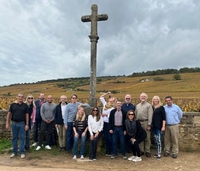 WSG and NVWA study abroad tours typically range from five to seven days with a maximum group size of 14 to 18 participants. Classic regions like Bordeaux, Burgundy, Champagne, and Piedmont are always in high demand, and both organizations run tours to other popular destinations that vary from year to year. The WSG has more than a decade of experience touring the wine regions of France, Italy, and Spain – trips to Alsace, the Rhône Valley, Tuscany, Sicily, and Rioja are perennial favorites – and recently expanded its offerings to include Germany and Portugal. NVWA solicits feedback from its students and newsletter subscribers to help select tour destinations. Its 2024 lineup includes trips to several European wine regions as well as Argentina, Chile, and South Africa.
WSG and NVWA study abroad tours typically range from five to seven days with a maximum group size of 14 to 18 participants. Classic regions like Bordeaux, Burgundy, Champagne, and Piedmont are always in high demand, and both organizations run tours to other popular destinations that vary from year to year. The WSG has more than a decade of experience touring the wine regions of France, Italy, and Spain – trips to Alsace, the Rhône Valley, Tuscany, Sicily, and Rioja are perennial favorites – and recently expanded its offerings to include Germany and Portugal. NVWA solicits feedback from its students and newsletter subscribers to help select tour destinations. Its 2024 lineup includes trips to several European wine regions as well as Argentina, Chile, and South Africa.
I recently spoke with Mary Kirk, WSG’s Study Abroad Manager, and Catherine Bugue, Director of Education at NVWA, about what makes a wine study abroad trip unique and what types of experiences participants can expect. In the interest of full disclosure, I’ve taken several WSG tours over the years and have thoroughly enjoyed every single one. Having gone at the beginning, middle, and end of my Wine & Spirit Education Trust (WSET) studies, I can attest that these trips cater to wine lovers of all backgrounds and experience levels. My tours have included a mix of students, industry professionals, and collectors, but I’ve also met individuals and groups of friends who simply enjoyed wine and wanted to learn more about it in a fun, relaxing, and low-stress environment. With that in mind, here are eight great reasons to consider a wine study abroad trip:
Access to Top Wineries and Special Wines
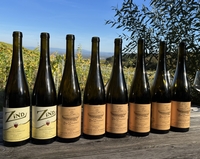 Prestigious wineries typically aren’t open for public tours and tastings. Getting an appointment often requires a stroke of luck or an insider connection. Over many years, the teams at WSG and NVWA have built relationships with top name estates and established networks that can open doors to otherwise inaccessible places. Visits include iconic producers as well as up-and-coming wineries and hidden gems flying below the radar. Be prepared to sample a lot of wines! Depending on where you’re visiting, you may taste vertical flights to understand how wine ages, horizontal flights to explore the influence of terroir, or try rare cuvées not available on the export market.
Prestigious wineries typically aren’t open for public tours and tastings. Getting an appointment often requires a stroke of luck or an insider connection. Over many years, the teams at WSG and NVWA have built relationships with top name estates and established networks that can open doors to otherwise inaccessible places. Visits include iconic producers as well as up-and-coming wineries and hidden gems flying below the radar. Be prepared to sample a lot of wines! Depending on where you’re visiting, you may taste vertical flights to understand how wine ages, horizontal flights to explore the influence of terroir, or try rare cuvées not available on the export market.
Meet and Taste Directly with Winemakers
The best fine wines are an expression of their terroir, but showcasing that expression reflects a series of deliberate choices made by the men and women who craft them. Tasting alongside the winemaker is an opportunity to hear not just the technical details, but also the stories behind the wines. On a WSG study abroad trip to Alsace, Mary Kirk recalls a group tasting with Olivier Humbrecht MW, winemaker and General Manager at the renowned Zind-Humbrecht estate. On a walk up to the Clos Windsbuhl vineyard, Olivier explained the influence of the vineyard’s soils, topography, and vine training methods – a memorable prologue to the tasting awaiting them at the top of the hill.
Interaction with Local Experts and Global Wine Educators
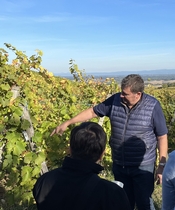 A key difference between study abroad tours and ordinary wine tours is that the former are led by expert wine educators. WSG and NVWA partner with award-winning journalists and sommeliers, Masters of Wine, and local experts, all with extensive experience living or working in the area you’re visiting. Whether it’s during a masterclass or a lecture on the bus between wineries, tour instructors and local hosts provide educational yet entertaining information about the region, the wineries, and the local culture. There are also plenty of chances to chat with them one-on-one during lunches and dinners.
A key difference between study abroad tours and ordinary wine tours is that the former are led by expert wine educators. WSG and NVWA partner with award-winning journalists and sommeliers, Masters of Wine, and local experts, all with extensive experience living or working in the area you’re visiting. Whether it’s during a masterclass or a lecture on the bus between wineries, tour instructors and local hosts provide educational yet entertaining information about the region, the wineries, and the local culture. There are also plenty of chances to chat with them one-on-one during lunches and dinners.
Gourmet Food and Wine Pairings
Each tour includes several group lunches and dinners, typically multi-course meals, and there’s always plenty of wine to go around. Restaurants may be Michelin-starred establishments or casual venues with distinctively local flair, chosen for quality of their food (and the depth of their wine list). Catherine Bugue told me about a favorite restaurant that NVWA visits on their trips to Piedmont, La Terrazza Renza, and fondly remembers their authentic home cooking and gorgeous view of Barolo’s vineyards. Group meals also include pairings with premium wines, chosen by tour instructors or local hosts to showcase different styles from across the region.
Hands-on Learning You Can’t Get Elsewhere
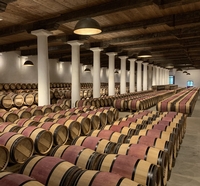 Some things you just can’t learn from books alone. The same goes for Instagram and Tik Tok. There’s no substitute for climbing the slopes, tasting grapes from the vine, smelling the barrel room, or savoring a dusty bottle pulled directly from the cellar. These memories forge a lasting connection to the wine and the place it came from.
Some things you just can’t learn from books alone. The same goes for Instagram and Tik Tok. There’s no substitute for climbing the slopes, tasting grapes from the vine, smelling the barrel room, or savoring a dusty bottle pulled directly from the cellar. These memories forge a lasting connection to the wine and the place it came from.
Hassle-free Travel Arrangements
Other than booking a flight and deciding what to pack, there’s not much advance planning required. Tours include lodging at conveniently located 4-star hotels, most meals, and transportation between the wineries. Best of all, you don’t have to drive. You won’t miss a winery appointment because your rental car’s GPS led you astray (ask me how I know) or worry about whether it’s a bad idea to enjoy a second glass of wine with lunch. A tour manager also accompanies the group to make sure everything runs smoothly behind the scenes and can help sort out any issues or emergencies that might arise.
Small Group Camaraderie
Drinking wine is a social experience. As much as I love traveling solo, it seriously compromises my ability to try as many different wines as I can. Being part of a small group of like-minded people who are equally passionate about wine is a win-win. WSG and NVWA help participants get acquainted ahead of time by arranging virtual meet-and-greets and setting up group communication forums. It’s not uncommon for participants – or even entire groups – to stay in contact long after a tour ends, whether its sharing pictures from their latest wine travels or meeting up for a drink if someone is passing through town.
Experiences You’ll Never Forget
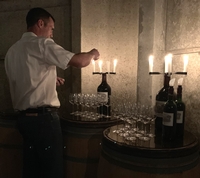 A wine study abroad tour is a memorable experience. Visits and tastings are thoughtfully curated to deepen your appreciation and understanding of wine, and the insider access to some of the world’s most sought-after cellars and vineyards certainly doesn’t hurt. Thinking back on my WSG tours, three experiences stand out: a vertical tasting of Lafite Rothschild, by candlelight, in their circular barrel room; a horizonal terroir tasting with a Burgundy négociant comparing more than a dozen wines from three villages across multiple quality levels; and a morning spent in Moulin-à-Vent walking through seven vineyards, stopping to listen to a presentation from a different winemaker in each, and then returning to a château for a collective tasting of all the wines.
A wine study abroad tour is a memorable experience. Visits and tastings are thoughtfully curated to deepen your appreciation and understanding of wine, and the insider access to some of the world’s most sought-after cellars and vineyards certainly doesn’t hurt. Thinking back on my WSG tours, three experiences stand out: a vertical tasting of Lafite Rothschild, by candlelight, in their circular barrel room; a horizonal terroir tasting with a Burgundy négociant comparing more than a dozen wines from three villages across multiple quality levels; and a morning spent in Moulin-à-Vent walking through seven vineyards, stopping to listen to a presentation from a different winemaker in each, and then returning to a château for a collective tasting of all the wines.
If there’s one downside to the WSG and NVWA study abroad tours, it’s that demand almost always exceeds supply. The most popular tours book up quickly, sometimes in a matter of days or weeks. Registration for WSG tours typically opens at the end of September or beginning of October (for tours offered the following year). WSG members receive priority access, with the opportunity to register a week or so before the tours are available to the public. NVWA’s registration process usually begins in November and subscribers to NVWA’s newsletter and prior tour attendees receive advance notification of upcoming trips. If you have your eye on a tour that’s already sold out, it’s worth getting on the waitlist, as spots can and do open due to cancellations.
The number of repeat participants on these tours is testament to their appeal. An astounding share (close to 40%) of people who attend one WSG tour end up coming back for another one. “The loyalty and enthusiasm of our returning guests speak volumes about the rewarding experiences they’ve had with us,” Mary tells me, noting that some guests have joined them for upwards of 10 study abroad trips. Similarly, NVWA has also seen “a lot more repeats than they ever dreamed of,” with some participants now having registered for their fourth tour.
While there is no shortage of options for learning about wine, very little comes close to seeing the process up close and personal. Whether you’re a seasoned oenophile or just starting off, a wine study abroad tour is a terrific opportunity to explore the heart of a region and forge a lasting connection with the places and stories behind the bottles.
Photos courtesy of the author and the Wine Scholar Guild: www.winescholarguild.com
For more information about WSG and NVWA wine study abroad tours, visit:
www.winescholarguild.com/tours and www.napavalleywineacademy.com/wine-education-abroad
